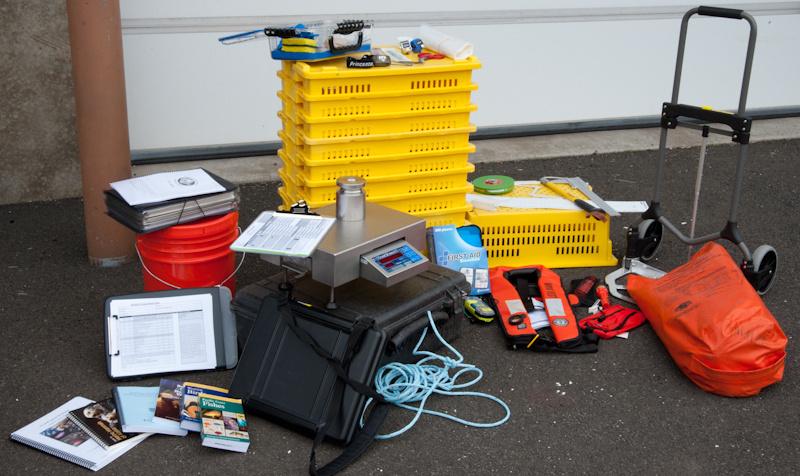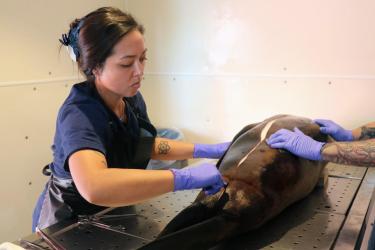Observers are independent field biologists that are deployed aboard commercial fishing boats and at-sea processing facilities, and their work is vital to NOAA's mission of ensuring the economic and ecological sustainability of US fisheries. Vessels operating in the West Coast Groundfish Trawl Catch Share Program are required to carry a certified observer on all fishing trips. In other fisheries along the West Coast, observers are assigned to fishing trips at random.
What do observers do?
While at sea, observers collect a wide range of information. For example, they monitor and record catch data, particularly any discards (the unused catch that is returned to the sea) and endangered or threatened species caught. Observers also collect species data, including diversity of catch, condition of fish caught, seabird sightings, and any marine mammal interactions with fishing operations. In addition, they gather biological data, such as sex, fish lengths, and weight.
Data is the key to a sustainable fishery
The data collected by observers, together with the data gathered when ships bring their catch to shore for processing, is used to establish the total catch for the fishery.
Fishery scientists and managers depend on accurate data for species stock assessments, tracking quotas, scientific research, and management decisions. Some fishermen also use observer data to track their own quota levels within the Catch Share program.
To perform their duties, observers must have an extensive knowledge of fish species identification, biology, and data collection protocols. And, because much of the work is done in dangerous environments, observers must be well versed in at-sea safety and the rigors of working at sea.
Rigorous and comprehensive training
The NWFSC's Fishery Resource Analysis and Monitoring Division administers a comprehensive and internationally recognized training program for West Coast Groundfish observers.
All observer trainees take an in-depth, hands-on 15-day training course during which they get an intensive overview of commercial fishing gear and strategies, sampling processes, and identification of fish, invertebrates, birds, sea turtles, and mammals of the West Coast. Trainees learn how to collect the appropriate fishery data and how to work efficiently under the strenuous conditions on commercial fishing vessels. Trainees must also demonstrate that they have the aptitude to perform this difficult job independently and to act professionally in stressful situations. Observer trainees must pass with a minimum score of 80 percent to become certified.
Critical Safety Skills Training
Observer safety is the number one concern at all times – trainees must become proficient in at-sea safety. Fortunately, safety training is one of the strengths of the West Coast Groundfish Observer Program. Observer trainers have conducted safety training for both Ghana and Senegal through NOAA International Affairs. The Program is active with the International Fisheries Observer Conference, with team members sitting on steering committees and moderating safety panels at the last five conferences. The team conducted a Train the trainers workshop for safety drill instructors at the Portland, Maine conference in 2009.
While all observers have the right to refuse to go out to sea if they feel that conditions aboard a vessel are unsafe, they must also be prepared to respond immediately to a variety of potentially dangerous situations while at-sea.
Ongoing Support and Training
Once certified, observers work closely with NOAA debriefers that provide logistical and scientific support and review the quality of the data collected by observers. Returning observers that have valid certification must attend a shorter, though no less rigorous, training and pass all required tests.
The West Coast Groundfish Observer Program boasts a high rate of returning observers, which underscores the value of the comprehensive training and the close mentoring relationships that often develop between observers and debriefers.
Scientists and fishery managers rely on observers to collect high-quality, unbiased information. Without the input of observers, arriving at an accurate picture of the fishery, particularly of bycatch (unintended catch) and interactions with protected species, would be considerably more difficult. Well-trained observers are integral to the operations of the West Coast Groundfish Fishery and to maintaining the ecological and economic stability of this valuable natural resource.



